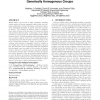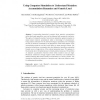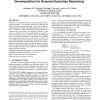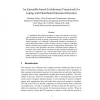602 search results - page 59 / 121 » Unsupervised Problem Decomposition Using Genetic Programming |
122
click to vote
GECCO
2010
Springer
15 years 7 months ago
2010
Springer
Within nature, the success of many organisms, including certain species of insects, mammals, slime molds, and bacteria, is attributed to their performance of division of labor, wh...
117
click to vote
ICCS
2007
Springer
15 years 8 months ago
2007
Springer
Long-standing theoretical concerns about mutation accumulation within the human population can now be addressed with numerical simulation. We apply a biologically realistic forward...
ISSTA
2006
ACM
15 years 8 months ago
2006
ACM
Finite-state verification techniques are often hampered by the stateexplosion problem. One proposed approach for addressing this problem is assume-guarantee reasoning. Using rece...
120
click to vote
ICCBR
2003
Springer
15 years 7 months ago
2003
Springer
Abstract. The definition of similarity measures is one of the most crucial aspects when developing case-based applications. In particular, when employing similarity measures that ...
150
Voted
GPEM
2010
15 years 21 days ago
2010
A distributed data mining algorithm to improve the detection accuracy when classifying malicious or unauthorized network activity is presented. The algorithm is based on genetic p...




